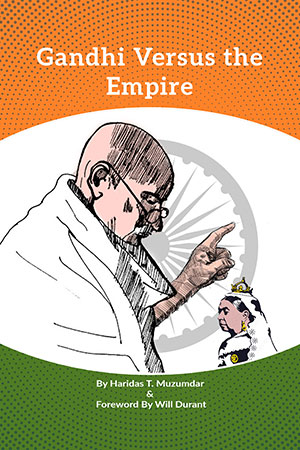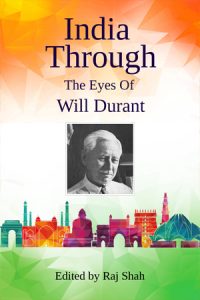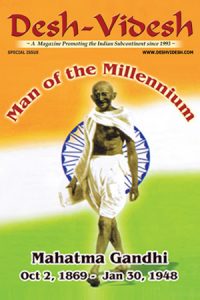Description
Gandhi Versus The Empire by Haridas T. Muzumdar & Foreward by Will Durant
Contemporary India has so few unimpeded opportunities to present its case to the world that those who sympathize with its struggle for freedom must gratefully welcome this book by Dr. Muzumdar. The author has gone directly to Gandhi himself for a statement of the Indian position; and the many passages in which the great leader is directly quoted illuminate not only Gandhi’s political creed, but his profoundly revolutionary philosophy of life. No other leader in the world today seems so sane or so humane. If his plan should be carried out successfully it would constitute a transformation and an achievement more fundamental than that of Soviet Russia; for it would transcend the Industrial Revolution itself, and offer an alternative to the apparently inevitable domi nation of human life by the machine.
I do not know if such an effort can succeed or if the power of a gentle soul can stand in this world against imperial force; but I am sure that this attempt to accomplish the unprecedented lifts us up, more than anything else has been able to do, out of the cynicism and pessimism which poison the spirit of our time; and that this strange revolution by prayer and suffering does more than anything else around us to give some significance and nobility to our day.
If you would feel the soul of India, of the deepest and gentlest people known to history, read this book on Gandhi, and read the poetry of Tagore. It is incredible that a nation capable of producing such men should not soon be free.
About the Author
Haridas T. Muzumdar was born in Vyara, Gujarat, India, 40 miles from Surat.He graduated from Union High School in Surat. After attending Bombay University for two years he came to the United States, receiving his B.A. and M.A. degrees from North western University and his Ph.D. from the University of Wisconsin, with a major in sociology. In 1929 Dr. Muzumdar went to India where he became intimately associated with Mahatma Gandhi. A year later, at the suggestion of the late Pandit Motilal Nehru, he returned to the United States to make an extensive lecture campaign on behalf of India’s freedom. In the summer of 1931 Mr. Muzumdar spent a month in London with Gandhi, observing and studying at first hand the Second Round Table conference. Upon his return from Europe, Dr. Muzumdar continued his activities on behalf of India’s freedom until 1944, when he resumed formal teaching. Dr. Muzumdar was professor of sociology and social work at Cornell College in Iowa. He has also taught at William Penn College, Ohio Wesleyan University and the University of Wisconsin. He is the author of Gandhi the Apostle, India’s Non-Violent Revolution, Gandhi Versus the Empire, Gandhi Triumphant, Invitation to Peace and The United Nations of the World.
One of the most important virtues of Dr. Muzumdar’s account of Gandhi is the clear exposition he makes of Gandhi’s ideas and the influence they have had on all the Hindese peoples—a point of cardinal importance for Americans if they wish to understand India’s present-day policies and the men who are directing them. Dr. Muzumdar has been, for many years, in a position to observe closely the results of Gandhi’s ideas, for he was intimately associated with India’s fight for freedom. He attended the historic Lahore session of the Congress and was Gandhi’s guest at the Satya- graha Ashram for three months, and in the spring of 1930 he participated in Gandhi’s famous Salt March to the Sea. However, Dr. Muzumdar was educated in the British system in India and later in American universities; his training in the disciplines of history and sociology enabled him to analyze and to understand both sides of the picture. His book presents a clear and unbiased examination of Gandhi’s policies and the effect they have had on India’s millions. It is one of the finest volumes in The Twentieth Century Library.





